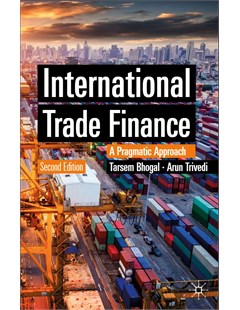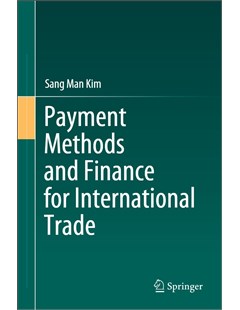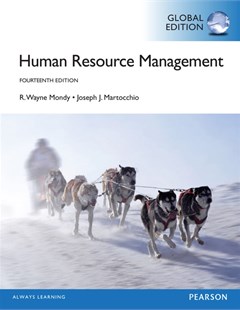International Trade Finance A Pragmatic Approach
The Finance and Capital Markets series is designed to bring you high-quality, cutting-edge information on the latest issues and developments in the financial world. These authoritative yet accessible books, written by experts in their field, provide clear, practical guidance not only for industry professionals, but also serve as a framework of current analysis for scholars and form a comprehensive reference resource for libraries.
2019
The 21st century has witnessed swift change in every sphere of the human endeavour. Regulatory re-alignment, digitalisation and economic and political developments have contributed to paradigm shift in banking, trade, finance and the shipping industry virtually transforming the landscape. International Trade Finance is an essential tool for bankers, exporters/importers, shippers, consultants, teachers and students navigating the procedures of international trade finance.
The book addresses basic topics relating to international trade including letters of credit mechanism, collections of bills, trade customs and practice. New to this revised edition, it covers SWIFT updates, supply chain system, UKEF, Blockchain technologies, the implications of BREXIT, NAFTA, Mexico, Canada and other bilateral agreements and their implications, the US sanctions, terrorist financing and anti-money laundering provisions, and a check list to control financial crime risks in trade finance.
The extended metaphor of the book is that of an arm chair tour covering fundamentals to the nuances of the hard core of the subject matter and enabling the readers to deal with complicated implementation issues in a forthright and comprehensive fashion.
The global trading system is undergoing a period of transition. Shifting economic circumstances, major advances in technology and the emergence of new players on the global scene all underscore that we are on the cusp of big changes. Persistent imbalances, driven largely by macro-economic factors, con-tinue to be a cause of concern in some major economies.
Even in such a climate of uncertainty, one thing is certain: that there is a great need to strengthen the global trading system by making it more equitable and relevant for those who trade in the twenty-first century with Uniform Customs and Practice.In retrospect we find that in 2005, the value of world merchandise exports rose by 13% to $10.1 trillion and the value of world commercial services export by 11% to $2.4 trillion.
The volume and value of international trade is a testimony to make us believe that the world order has changed quite swiftly over the past ten years at a much faster pace than that of the previous 20 years. It is difficult to contemplate what the world trade/economies will look like in 2010. One thing is certain, however: Change is inevitable. Bankers and trad-ing communities operating in such a climate will have to face challenges that are immense.Technology has indeed opened up new markets, with geographic boundar-ies becoming non-existent to the web-enabled community.
What we see today is the beginning of the reaction to this expansion as an outcome of globalisa-tion and internationalisation, adding multi-complexities to the players in the international trade.In this spectrum, industry practitioners will solicit solace by resorting to basics and learning the lesson of the laser. How to understand rather than find a solution from the ponderance?
The book is organised into 25 chapters endeavouring to address key topics relating to the gamut of international trade, letter of credit mechanism, collections, trade customs and practice, and so on. We do not pretend that all technical concerns are answered but we are confident that we have gone much further than any other published material on the subject. Dealing with complicated implementation issues in a forthright and comprehensive fashion and design, we have given a lucid account of provisions vis-à-vis trade customs and practice while protecting the interests of the parties involved in international trade.
Tarsem Bhogal, Arun Trivedi , International Trade Finance A Pragmatic Approach, Finance and Capital Markets Series, 2019.
 |  |  |
| Payment Methods and Finance for International Trade | Human Resource Management, Global Edition |
Thứ Sáu, 15:02 16/07/2021
Copyright © 2018 Hanoi University of Industry.